Jean Andoche Junot. "Crazy" friend of Bonaparte
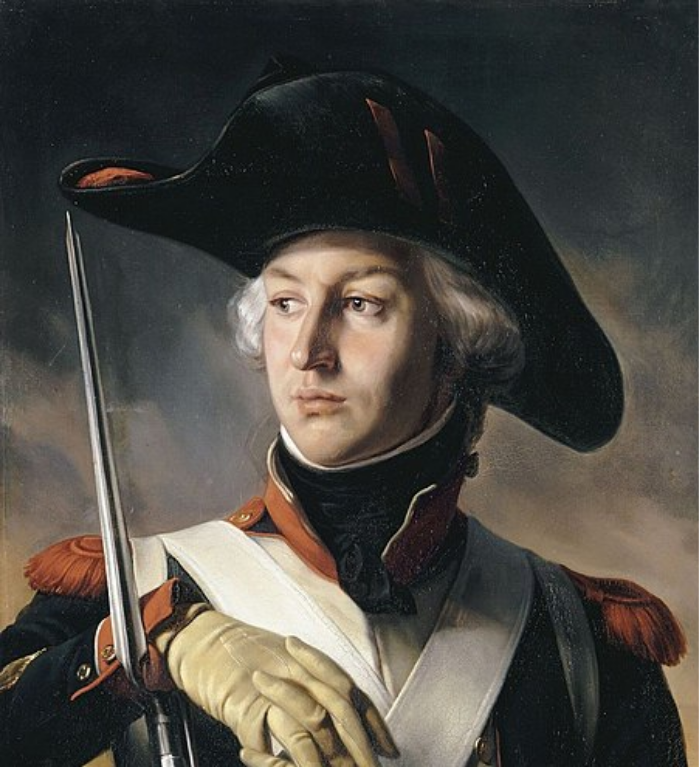
Filipoto. Junot in the uniform of a grenadier sergeant of the second battalion of the Côte d'Or, 1792
The hero of our today's article has an ambiguous reputation. Jean Andoche Junot was one of the few close associates of Napoleon who had known him since the first glory of the brilliant assault on Toulon. Unlike many generals and marshals, he not only served Bonaparte, but was his friend. Throughout his life, Napoleon was surrounded by exceptionally brave people, but it was about Junot that Bonaparte said that he "went into the fire, like to a ball." However, due to the nature of the character, aggravated after repeated wounds in the head, even in his best years, Junot had a reputation as not quite a normal person. And with the light hand of Bonaparte in the army, Junot was given the nickname "Junot the Tempest" (Junot la Tempête). We will talk about this general in today's article.
Early life and early military service Junot
This man was born on September 24, 1771 in the Burgundian town of Bussy-le-Grand, which is located 60 km from Dijon. His father was a wealthy timber merchant, Junot was the youngest of the three children of this family. Parents dreamed that he would become a lawyer, and therefore the boy was sent to study at the college of Chatillon-sur-Seine. Here, among Junot's classmates were Auguste Frederic Louis Marmont and Jean-Baptiste Muiron. The first of them will become the Marshal of France and will be "appointed" by Bonaparte as the main traitor of this country. The second on November 15, 1796, will die on the Arcole bridge next to Napoleon, the ship on which Bonaparte will return from Egypt to France will be named after him.
After the start of the revolution, Marmont managed to obtain a patent for a junior lieutenant of the Chartres battalion. And Junot and Muiron on September 1, 1791 joined the battalion of the National Guard of the Côte d'Or department. At this time, Junot was 19 full years old - he will be 20 in three weeks.
Junot acquired his first combat experience in 1792-1793. in the ranks of the Northern and Rhine armies. During this time, he received a saber wound in the head in the battle of La Glizuelle (near Maubeuge) and rose to the rank of sergeant.
Finally, Junot and Muiron ended up near Toulon, where they met again with Marmont. It was here that their truly fateful acquaintance with Napoleon took place. Thanks to calligraphic handwriting, Junot became a clerk, and then an adjutant of Bonaparte, who appreciated his courage. They say that once the earth from a cannonball that struck nearby covered a sheet of paper on which this young Burgundian wrote. Shaking it off, Junot calmly said to Bonaparte:
At first, everything went quite well. Bonaparte, who received the rank of brigadier general, was highly appreciated by General Dugomier, who commanded the troops at Toulon, and Auguste Robespierre, brother of Maximilian, chairman of the National Convention. New friends of Napoleon also received a promotion, it was then that Junot became an officer.
But after the coup on 9 Thermidor (July 27, 1794), General Bonaparte was arrested. Junot and Captain Marmont were out of work. Moreover, they could also end up in prison at any moment as friends and accomplices of the "state criminal". However, nothing compromising in the activities of Napoleon was found, and after 2 weeks he was released from prison. But the brilliance of the Toulon victory had already faded, and the young Corsican quickly felt it.
Having moved to Paris, he tried to achieve a new appointment. However, he refused to go to the Vendée under the command of Lazar Gosh on the grounds that he wanted to command artillery, not infantry. After that, he was dismissed without any special prospects for returning to the service - there were enough young and ambitious generals in the republic. At this time, next to him were two people who were the first to believe in the notorious "star" of Bonaparte - Marmont and Junot. Marmont later recalled that time with nostalgia:
It is curious that all three lived mainly on the money that Junot received from his parents and won at cards (he was often lucky in the game).
They were literally saved by the royalist rebellion of 13 Vendemière (October 5), 1795. Barras, who remembered Bonaparte from the time of Toulon, entrusted him with the defense of the Convention. Having deployed 40 cannons at the Tuileries, Napoleon scattered the crowds of attackers with volleys of buckshot at close range, and then, going on a counterattack, completely defeated them. The rebellion was crushed in half a day. At this time, Junot was next to Bonaparte. When it was over, Napoleon said to him:
Junot in Bonaparte's army
During Napoleon's First Italian Campaign, Junot was his aide-de-camp. This position did not in the least prevent the Burgundian from taking an active part in the battles. On August 3, 1796, during the Battle of Loano, Junot almost died while pursuing one of the enemy's uhlan detachments: breaking away from other units, he was surrounded and received six saber blows, including in the head.
Many note that it was after these injuries that the already rather complex character of Junot deteriorated significantly. They also talked about bouts of excruciating headaches, which over time became more and more frequent and prolonged. There were signs of progressive post-traumatic psychopathy. His wife Laura, in her memoirs, says that once Bonaparte, as a sign of location, decided to gently pull Junot by the hair - and his palm turned out to be in blood: one of the old wounds opened.
But back to Italy. Having barely recovered, Junot took an active part in the battles of Arcola and Tagliamento. As a result, already on May 10, 1796, he received the rank of brigade chief, which corresponded to the rank of colonel (although it was approved by the Directory only in September 1798).
On June 3, 1797, near the river Seignnot, Junot led a detachment that defeated the military units recruited by Pope Pius VI.
It was Junot who was sent by Bonaparte to Paris with the news of the first victories (this mission has always been considered very honorable). He also accompanied Napoleon's wife Josephine Beauharnais on her way from Paris to Milan. On the way, he began an affair with one of Josephine's companions, but Napoleon's wife for some reason categorically objected to this relationship.
In 1798, Junot was part of Bonaparte's Eastern Army, which set out to conquer Egypt. Here he received his first general rank - January 9, 1799. Participated in many battles, including at Abukir, Alexandria, Jaffa, was the commander of the French troops in the Suez region. He was especially famous for the Second Battle of Nazareth, in which, at the head of a small cavalry detachment, he held back superior enemy forces for several hours and personally killed the son of the Mameluke commander, Murad Bey.
And in this illustration we see an episode of the battle, when two Mamelukes attacked Junot at once, he shot one with a pistol, the other he hacked to death with a saber.
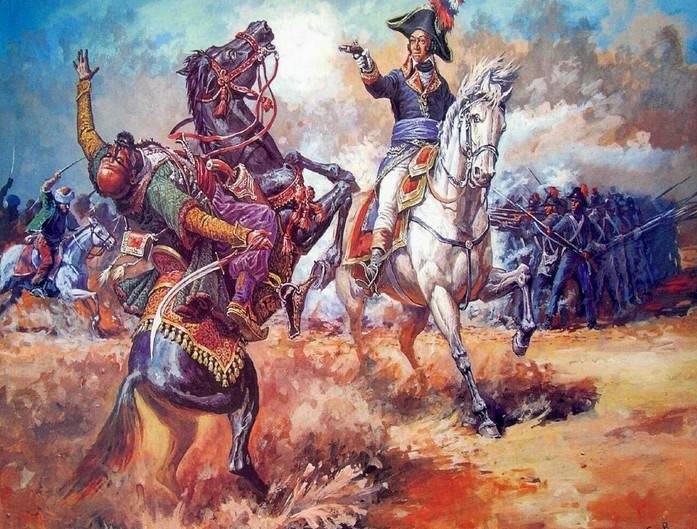
Some historians believe that it was from Junot that Bonaparte learned about Josephine's betrayal. However, this was written in English newspapers intercepted by the French, so it is unlikely that the commander's wife's adultery was a secret in the Eastern Army.
In Egypt, Junot received another severe wound, this time in the stomach, and the Turks or the Mamelukes were not involved in this. He was wounded in a duel by French General Pierre Robert Lanusse. Junot was the instigator of the duel, who did not like how Lanusse spoke about Bonaparte. Junot was sent to France for treatment, but the ship was captured by the British, and he returned to his homeland only on June 14, 1800, on the day of the battle of Marengo. Thus, Junot did not participate in the coup of 18 Brumaire (after which Napoleon became First Consul) and in the Second Italian Campaign of Bonaparte.
However, Napoleon did not forget his old friend. In 1801, Junot received the rank of divisional general and the important post of commandant of the capital, which he held for 4 years. In December 1803, he was also appointed commander of the Arras Reserve Grenadier Corps. After the coronation of Napoleon, Junot also received the post of Colonel-General of the Hussars of the Consular Guard.
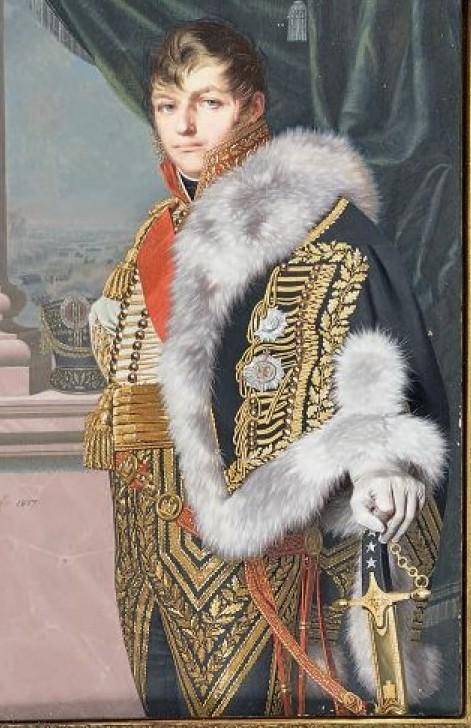
Laura Person: the "little plague" of General Junod
Junot's wife was Laura Adelaide Constance Person.
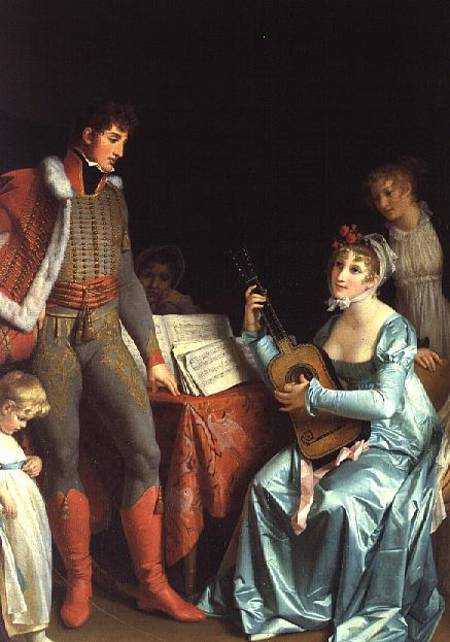
Her mother was a friend of Letizia Buonaparte, and Laura assured everyone that the young Napoleon almost became her stepfather - he allegedly wooed this "overripe" beauty. Junot's wife also claimed that their family was descended from the illegitimate offspring of one of the dynasties of the Byzantine emperors.
The first consul called it "the little plague." At the same time, as a family friend, during his stay in Malmaison, Napoleon often came to her house in the morning. According to Laura herself, in her bedroom the First Consul liked ... to read the latest newspapers, which the woman did not like and very embarrassed her. It ended up that one fine day in 1803, Bonaparte and Junot met in Laura's bedroom. It is not known what Junot thought then, but he pretended that he did not see anything reprehensible in the early visit of the First Consul.
Over time, Laura's excessive political activity and her dubious acquaintances began to annoy Bonaparte. He also cooled somewhat towards his friend, who was becoming more and more quick-tempered and irritable. As a result, in March 1805, the emperor sent Junot (along with his wife) to Lisbon, where he replaced Lannes as ambassador of the French Republic. Jean Andoche and Laura returned to France on the eve of a new war - the Third Coalition.
Later, Laura accompanied her husband during the war in the Iberian Peninsula, where she desperately intrigued against Henriette Leberton, the passion of Marshal Massena. Junot sided with his wife, and his relationship with the marshal, to put it mildly, did not work out. Ney also did not want to recognize Masséna's primacy. All this did not contribute to the success of the French weapons.
In 1808, in Paris, Laura Junot was for some time the mistress of the Austrian ambassador, the notorious Metternich, who, by the way, had similar relations before her with Murat's wife, Caroline Bonaparte (he was a clever diplomat, you won't say anything). Later, after the death of her husband, Laura became a monarchist.
She also became famous as the mistress of the young Honore de Balzac, who edited her memoirs. She was also well acquainted with Theophile Gauthier, who changed her title of Duchess of Abrantes into "Abracadabrantes".
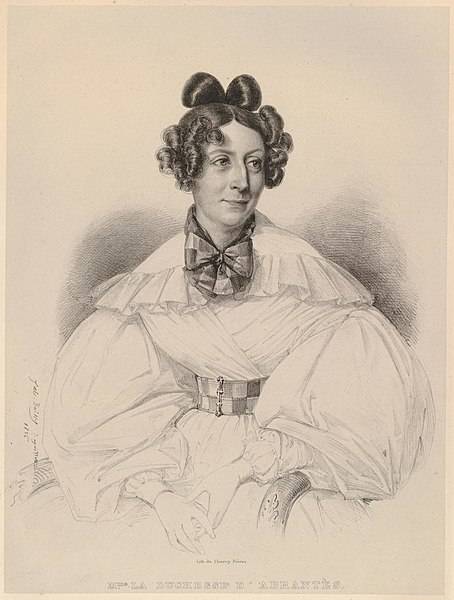
At the end of her life, abandoned by everyone, Laura was in great need and died practically in poverty in 1838. At that time she was only 54 years old. She was buried in the Montmartre cemetery.
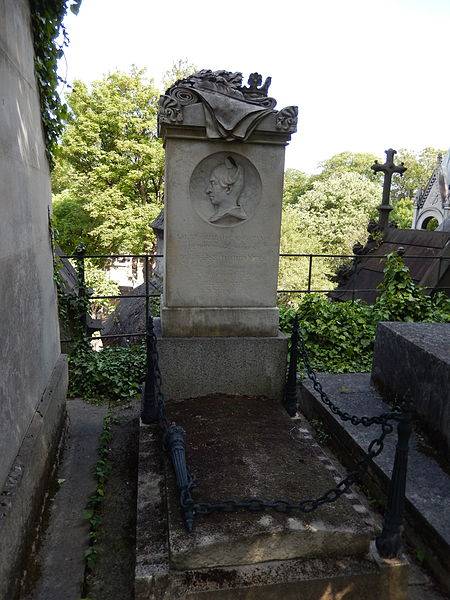
The continuation of the military career of General Junod
During the battle of Austerlitz, Junot was next to Napoleon as his First Adjutant.
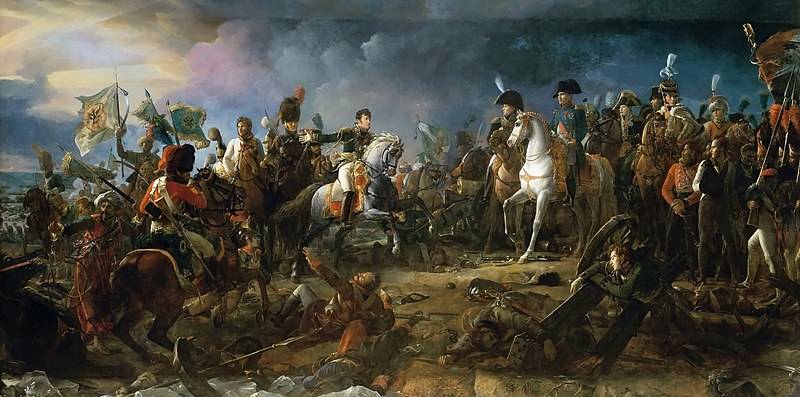
On January 19, 1806, he received the post of governor of the province of Parma and Piacenza. Here he severely suppressed anti-French speeches and was appointed commander of the troops in the Apennines. In July of the same year, having transferred his position to Marshal Catherine-Dominique Perignon, he returned to Paris, again becoming the governor of this city and commander of the First (capital) military district.
At this time, Junot entered into a relationship with Caroline Bonaparte and almost got into a duel with her husband, Joachim Murat. However, Bonaparte did not approve of the duel between the marshal and the general, but he scolded Junot very strongly. His wife later claimed that this unpleasant conversation with the emperor finally shook the already weak psyche of her husband.
To finally interrupt this romance, on August 2, 1807, Napoleon appointed Junot as commander of the 25th Observation Corps, intended for operations in the Iberian Peninsula. The emperor did not trust the local king, who, moreover, brazenly refused to support the Continental blockade of Great Britain. The occupation of Portugal was entrusted to Junot.
Junot in the Pyrenees
On September 18, Junot's corps crossed the border and moved towards Salamanca, and from it to Alcantara. On November 30, Junot entered Lisbon, the Portuguese royal family fled to Brazil and returned to Europe only 13 years later.
Satisfied, Napoleon bestowed on his old friend the title of Duke d'Abrantes and appointed him governor-general of Portugal.
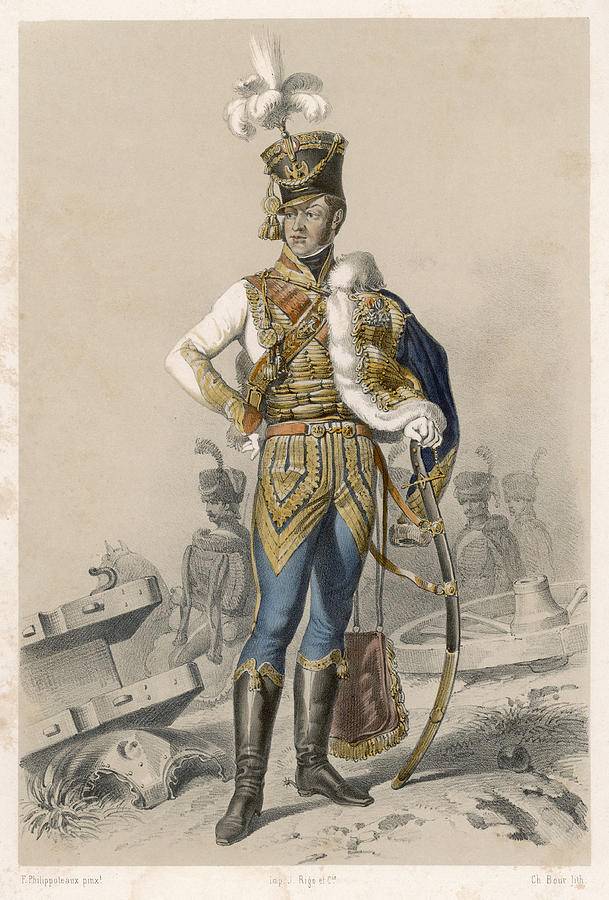
But soon anti-French uprisings began in this country, which at first did not seem too dangerous. The situation escalated and worsened after the landing of the British, led by Arthur Wellesley (in the future - the Duke of Wellington). The denouement came on August 21, 1808, when Junot's army was defeated in a battle with superior enemy forces at Vimeiro (here the British for the first time in stories used shrapnel).
On August 30, an agreement was signed in Cintra, according to which the French left Portugal, and the British on their ships evacuated their troops to France. The terms of this agreement turned out to be very soft for the French side: the army retained both banners and weapons.
At the end of December 1808, Junot arrived at the besieged Zaragoza, where he took command of the III Corps of Marshal Moncey (Moncey). Soon Lannes arrived here, taking over the overall command. Junot was here until the fall of the city.
In June 1809, Junot was transferred to Germany, where he became commander of the reserve army with residence in Nuremberg, as well as commandant of Frankfurt.
In January 1810, at the head of the VIII Corps, he again ended up in Spain and successfully acted in the battle of Astorga.
On April 12 of the same year, he was subordinate to Massena, with whom he did not work out. Junot participated in the battles of Ciudad Rodrigo, Sobralo and Rio Mayor (where he was wounded on January 19, 1811). In June of the same year he returned to France. Then in February 1812 he was transferred to Italy, where he received command of the Second Observation Corps.
1812 year
Junot still hoped to be promoted to marshal. At his request, the emperor transferred his old friend to the Grand Army on the eve of its last campaign. Very soon, when Jerome Bonaparte left for Westphalia, Junot was appointed commander of the VIII Corps. Meanwhile, his illness progressed rapidly, his comrades-in-arms looked with horror at the rapidly aging and degrading Junot. Captain Dupuis described him in his memoirs as follows:
Reason was already failing Junot, and one day he mixed up letters addressed to his wife and mistress.
During the battle for Smolensk, his units, trying to bypass the left flank of the Russians, ran into a swamp and could not support Murat.
said an annoyed Bonaparte.
Unsuccessful were the actions of Junot's subordinates during the battle of Valutina Gora. Junot was still considered the commander of the corps, but in the Battle of Borodino he no longer actually led it. The Westphalians were put at the disposal of Ney, they fought with the troops of General Baggovut and attacked the Bagration flushes.
During Napoleon's stay in Moscow, the VIII Corps occupied positions near Mozhaisk.
The army was already talking openly about Junot's madness. During the light intervals, he himself was aware of the depth of his fall and suffered greatly, realizing that he could not cope with his duties. Having already crossed the Berezina, he wrote to Napoleon:
At the beginning of 1813, Napoleon removed Junot from command of the corps and sent him to Venice - to the post of Governor-General of the Illyrian provinces. However, Junot just before our eyes turned into a deep invalid. He was tormented by constant headaches, and his psyche was absolutely upset.
Fouche was soon sent in his place, and Junot, who was dismissed, settled on his father's estate. Here, during one of the attacks, he, fleeing from some imaginary enemies, jumped out of the window and broke his leg, which he then tried to amputate on his own with a kitchen knife. Gangrene set in, and a few days later the insane general, before reaching the age of 42, died of sepsis. It happened on July 29, 1813.
Junot was buried in the cemetery of the city of Montbar. However, a monument in his honor can also be seen at the famous Pere Lachaise cemetery, where the graves of many of Napoleon Bonaparte's comrades-in-arms are located.
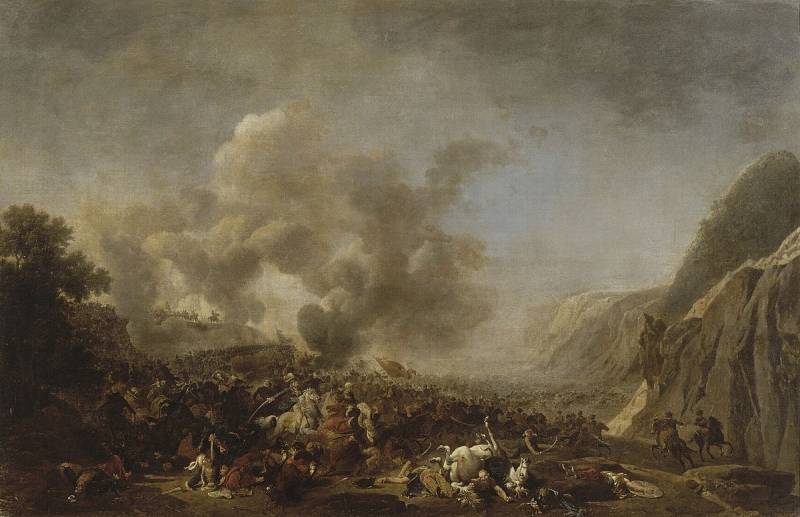
Information